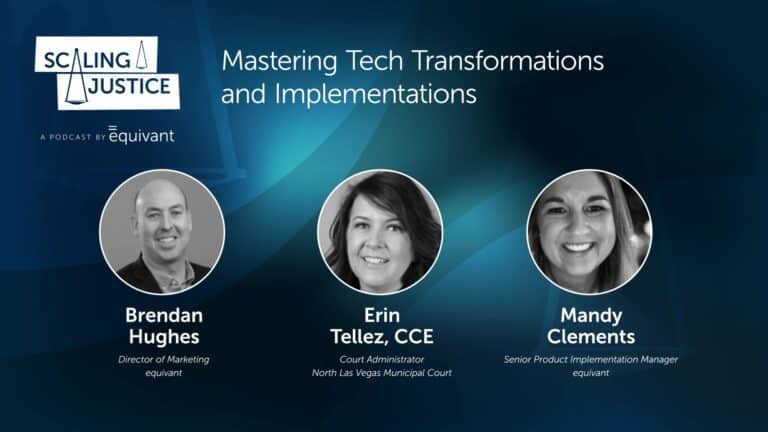Judges have a lot on their plate. But outdated systems and inaccessible information make it challenging to keep up with increasing demands. Fortunately, new technology is advancing quickly and there are more modern solutions available that offer the personalization and flexibility judges need to manage cases efficiently.
What is Judicial Tools?
Judicial Tools is case management that’s built specifically for judges and magistrates. The solution allows users to actively manage cases from any smart device, both in chambers and on the bench. Rather than spending time navigating the system, judges can focus on the data and personalize each screen to get the decision support needed at a glance.
Judicial Tools was designed with the needs of judges and magistrates in mind. The equivant team worked directly with judicial officers and listened to what was most important to deliver a solution that truly makes life easier for the user. Key features include:
- Decision support with visual layouts rather than lists of data to wade through.
- Personalized setup and views to accommodate different case types (i.e., no more forcing traffic cases into a view designed for felony cases).
- Case management capabilities, not just case maintenance or administration.
- Customizable notifications for updates to the workflow, calendar and attendance, individual documents, major case activities, and parties or participants.
- Flexible queries to help you find what you’re looking for right now.
- Fast and efficient interface.
Why Case Management for Judges is Important
The National Center for State Courts has been advocating for “convenient, intuitive, and effective” judicial solutions for years. ¹ They have pointed out that judicial officers have the same technology needs and capabilities as others in highly skilled roles, and yet many in the justice technology field have yet to recognize those needs. Operational efficiency and getting rid of the noise so users can focus on what’s important to their individual role is important for everyone working in the justice industry. But without tools that address the individual role, it’s impossible to cut out the noise.
When Honorable Jeffery Adler was elected to serve Girard Municipal Court as their Judge, he was excited about making a difference in his community. He quickly realized the impact new technology could have on the court’s efficiency and effectiveness. Physically filing papers and keeping track of court records by handwriting in a docket book only slowed caseflow down. By investing in Judicial Tools, Girard Municipal Court was able to reduce paper dependency by 75%.
Deciding if Judicial Tools is Right for You
If you decide to invest in a case management solution for judicial officers, it’s important that you find the best solution for you. By selecting Judicial Tools, you’ll get a flexible solution along with real-time data exchanges.
Many judicial solutions on the market today have one-way data movement, where data moves from the CMS to the judicial solution. This means that while a judge updates a case file, the clerk has to make identical updates in the CMS, requiring duplicate effort. When Judicial Tools and an equivant CMS work together, the data exchange moves freely in both directions, keeping everyone up-to-date instantly.
Technology is changing…and it’s changing fast. Embracing change can be hard, but there are so many exciting ways that technology can make your job easier. In an episode of Scaling Justice, How Judges Leverage Technology in Their Courts to Improve Efficiency, judges from Girard County, Ohio and the Alaska Superior Court share how they are navigating and leading technological change.
If you’re looking at a case binder right now, if you’ve called a clerk or tech person in the last week (or hour!) to drive your system for you, or if you’re fed up with tools that simply aren’t designed for you, contact us.
¹ JTC Resource Bulletin – Making the Case for Judicial Tools





